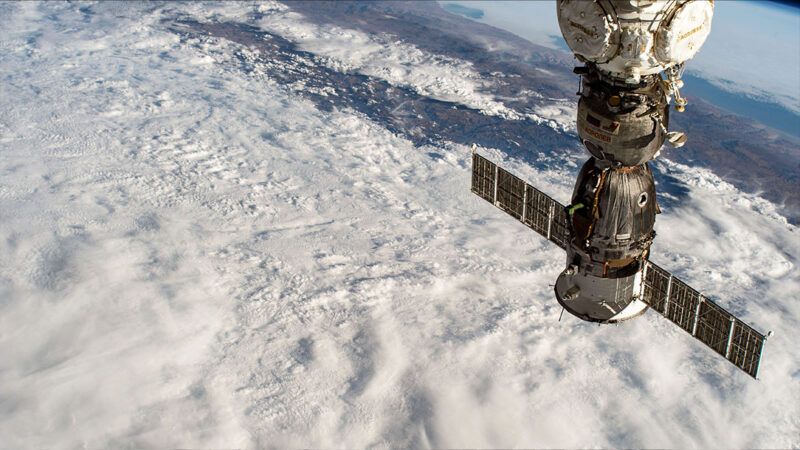So Long, Soyuz: Russia Is Leaving the International Space Station
Privatization can free orbital innovation from ground-bound politics.

After the Russian invasion of Ukraine and the Western sanctions that followed, Dmitry Rogozin, former head of the Russian space agency Roscosmos, signaled a looming end to the U.S.-Russia space partnership. "If you block cooperation with us," he tweeted in February, "who will save the ISS [International Space Station] from an uncontrolled deorbit and fall into the United States or Europe?" Elon Musk answered that call, replying with the SpaceX logo.
Private vessels can in fact do the job of Russia's Soyuz rockets. Terrestrial skirmishes no longer have to jeopardize cosmic exploration when companies like SpaceX can take astronauts to the ISS.
That's why Russia's August announcement that it will withdraw from the ISS after 2024—though it has since floated 2028 as the departure date—was of little concern. Who needs rides aboard a Russian rocket when a Crew Dragon capsule atop a Falcon 9 rocket can take astronauts to and from the ISS on autopilot?
Even before Russia's rocket rattling, Musk, other space industry figures, and U.S. politicians speculated that SpaceX could help replace the lost manpower and technology. In August, the European Space Agency (ESA) began to consider replacing its lost Russian rocket power with SpaceX launchers. Discussing private alternatives, ESA Director General Josef Aschbacher said the Ukraine conflict was "a wake-up call" that the European space program had become "too dependent on Russia."
Russia's invasion of Ukraine signaled an end to what has always been a fraught co-management of the ISS. Comprised of two halves, one operated by the Americans and one by the Russians, the ISS was briefly a shining example of the trust and cooperation necessary to maintain a space mission. But even before the 2022 invasion of Ukraine, the ISS proved to be a leverage point in terrestrial disputes. When Russia annexed Crimea in 2014, Rogozin responded to U.S. sanctions by saying NASA would need a trampoline to get to the ISS.
The arrangement was somewhat inspiring when it worked, but we have enough geopolitical conflict on Earth without also holding the cosmos hostage. In any case, the ISS is on its way out. NASA will retire the station by 2031, and three American companies—Blue Origin, Nanoracks, and Northrop Grumman—are developing new commercial space stations that NASA says "will be available to both government and private-sector customers."
Governments may have a hard time leaving their politics on Earth, especially during diplomatic crises. Privatization can free orbital innovation from ground-bound politics.
